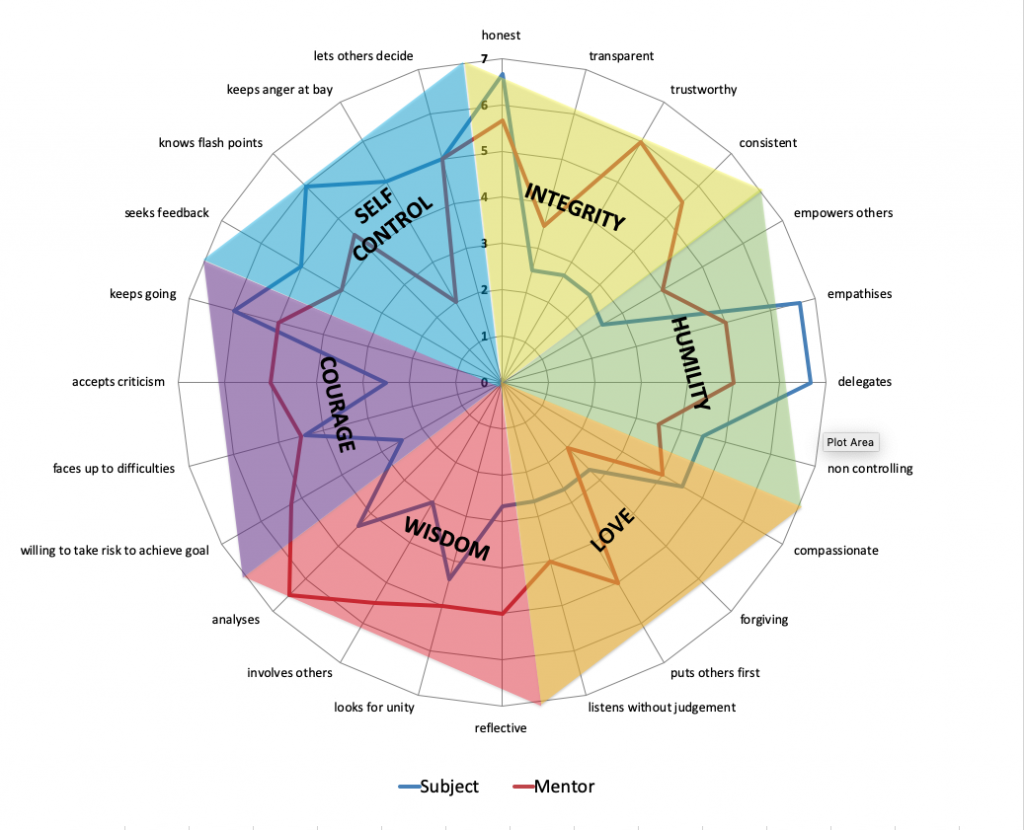

The virtues assessment questionnaire has been developed to evaluate where we are in our journey of growth as leaders in terms of the virtues that Plato described and that were later added to in the bible.
Take the Virtues Assessment Checkup

There are 60 questions in the Virtues Assessment Questionnaire that will take you about ten minutes to complete. Once you have completed the questionnaire your data will be analysed and a chart emailed to you with your personal assessment.
We recommend that you ask a mentor, close friend or colleague to also complete an assessment questionnaire. This will have the same questions but will be their view of you when they answer.
The Virtues Assessment Chart
The Virtues Assessment Chart is constructed from your own, or your mentor, friend or colleague’s evaluation of yourself using a Likert 7 point scale. This scales asks you, or your mentor, to evaluate whether a statement is Very True or Very Untrue of you – or somewhere in between!
Each of the 60 statements is associated with a number of character traits that map on to six virtues.
WISDOM
LOVE
HUMILITY
INTEGRITY
SELF CONTROL
COURAGE
Once you have completed the Virtues Assessment Questionnaire it will be used to produce your own virtue and traits chart like the one below. If your mentor, friend or colleague has also completed a questionnaire about you, their view of you will be overlayed onto your own answers.

Why Virtue?
The ideas behind this Biblical Virtues Based Self Assessment is to provide a practical tool that might provide a more detailed way to assess where we are against the biblical virtues that are necessary for good leadership. This should assist us in our leadership and spiritual growth and could also be used by a mentor/peer providing independent feedback.
Whilst some developments such as Situational Leadership and EQ have elements that resonate with biblical view on humanity and leadership, no approach has taken a uniquely Christian worldview for it’s underpinning. Recent research has highlighted the dark side of EQ and the danger that people with high EQ can manipulate others, a particular danger for those in leadership. EQ and ways in which to improve your Emotional Intelligence is now taught in many schools and businesses.
In a recent book, Return on Character, Fred Kiel demonstrates from 7 years research that a higher return on companies assets is generated by those leaders that display “virtuoso” character. His key metrics are Integrity, Responsibility, Forgiveness and Compassion. The suggested approach to developing a virtuoso character is however tackled from a humanistic viewpoint and as a set of self actualising techniques.
The recent growth of Positive Psychology and Virtue Ethics is finding it’s way in to schools in the guise of Character Development. Character Development borrows various virtues from the bible but otherwise has no connection with the Christian worldview. It has a more humanistic underpinning to character development.

Limitations of current assessment tools

One of the challenges in evaluating leadership is that the extensive research already undertaken has failed to determine a unique set of factors that make a good leader.
Many ideas have emerged, from Trait Theory, Servant Leadership to more recent theories on Emotional Intelligence, but no agreement on a unique set of features, skills or qualities has emerged.
There are burgeoning array of tests and evaluation methods aimed at leader in business and many of these have been adopted by Christians in NGO, Charities and even the church. These range from personality profiling through to leadership style evaluation, 360 reviews and Emotional Intelligence (EQ).
Personality profile constructs like Myers Briggs or “The Big Five” have been widely and enthusiastically adopted in Christian and non Christian circles. Unfortunately all of these have a Jungian philosophical foundation and none have ever been developed from a uniquely Biblical worldview perspective.
Research has also shown that Personality Type testing like Myers Briggs has no verified scientific basis and can be misleading. Approaches like 360 evaluations are of course potentially much more flexible and evaluation questions can be designed to suit but these are also not without their problems if carried out without care and proper follow up.

How the Virtues Assessment Tool was developed

The Virtues Assessment Tool was developed by Jeremy Peckham. The objective was to see if good leadership is defined in the Bible and if it could be boiled down to a relatively small number of qualities. Biblical teaching emphasises character over skills as requirements for good leadership and this has also been widely recognised as important in the secular world.
Is it possible to define character from a Christian worldview perspective? If we could, is it possible to measure it in some useful way, as Fred Kiel sought to do?
Even if character could be assessed in some way there remains the challenge of how we develop our character as leaders in a way that is not merely picking up secular techniques but that is truly biblical.
The starting point for defining leadership character from a Biblical perspective was to consider the virtues described in both Old and New Testaments. When considering what are generally regarded by theologians as biblical virtues, a rather large list emerges, all with opposite vices. Some attributes or virtues are mentioned specifically in the context of leadership in the church, such as the qualities needed for elders and deacons. Others are directly attributable to Jesus’ teaching on leadership recorded in the gospels.
Such a list can be distilled or grouped under six attributes or virtues, Integrity, Humility, Love, Wisdom, Courage and Self Control. Each of these virtues have a number of key dispositions, specifically related to leadership.

If these Virtues encompass what a good leader should be striving for, it might be possible and desirable to assess how close or far away we are from these, at least as far as specific aspects of leadership are concerned. This assessment would be done in much the same way as other evaluations are done in EQ or Personality Testing, by a set of carefully designed questions.
Any assessment will of course be open to the same problems that other questionnaire based testing has in so far as one cannot really be sure what is being measured, how accurately and to what extent answers to specific questions might be varied by context.
What is the Virtues Assessment Tool for?

The Virtues Assessment tool is not designed to provide a definitive profile or to type cast leaders in the sense that Personality Type testing does, but rather to provide a more penetrating basis for private discovery and reflection, perhaps even involving a peer or mentor. The process revolves entirely around a set of interconnected biblical virtues where the strength or weakness in any area can have a significant impact of how we lead.
To that end a virtue discovery questionnaire has been devised to assess strengths and weaknesses in the 6 broad virtue areas. Questions are targeted to discover how leaders respond in specific situations where these biblical virtues would produce a particular response were we to be “virtuous”.
The self assessment question design may need more work especially to balance negative/positive questions in the design also to elicit the key strengths and weaknesses as a diagnostic.
The intent is to provide a tool for pastors and organisational leaders to assess, from a biblical worldview, their strengths and weakness and thus areas for development, ideally with a mentor.
By basing the assessment entirely on biblical virtues, development can be progressed from a biblical perspective with the balance that the bible gives us between the virtues, rather than focussing on one specific area such as leadership style or Emotional Intelligence.
